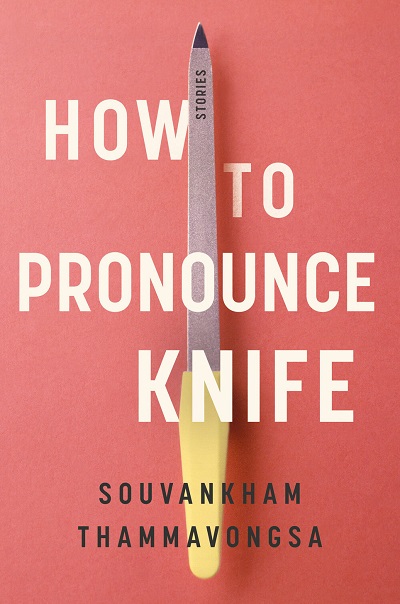“I am interested in the art of writing, the joys and pleasures and the power of reading.”
Souvankham Thammavongsa, author of short-story collection How to Pronounce Knife, answered questions of an alumna of The Shoe Project Simten Osken.

Photo by Sarah Bodri
Can you please tell us a little bit about yourself beyond your official bio?
I worked for fifteen years in the research department of an investment advice publisher. I counted bags and bags of cash for a big bank in downtown Toronto five levels below the basement. I prepared taxes. I have only had two creative writing teachers—one in high school and one in university. My high school creative writing teacher also taught Anne Michaels and Samantha Bee. I was once cast as a “greaser” for the rumble scene for a five-minute, all-female cast of “The Outsiders,” but then I got too nervous and watched for trains for the crew as it took place near a train track. I can knit and make quilts.
What inspired you to write “How to Pronounce Knife?”
My own real-life experience. My father taught me how to pronounce the word and I went to school and discovered the first letter was silent. I was not sad or ashamed or humiliated. I was alone with the language, and I knew it. I think when we encounter stories of immigrants or refugees they are always sad and that is such a narrow view of who we are. Even when my stories are funny and clever and make daring narrative moves, the only feeling that is described is sadness. As the writer, I work with that kind of prereading to undo it, to kick against it, to broaden it.
Where would you put your collection of stories among the other immigration books?
I don’t think of my book as an immigration book. That sounds like a government document and no fun at all. I’m interested in the art of writing, the joys and pleasures and power of reading. The art is my project. My book has characters who are immigrants and refugees, but the book is also about language, work, family, refusal, laughter, love—love of family, love of self, love of work. The stories deepen and broaden what we often see of these topics because they put at the centre of the characters that are not often at the centre of stories.
The burden of immigration on young kids is usually ignored. In “A Far Distant Thing” 12-year-old protogonist and her memorable friendship with Katie at one point drifted apart. Years after she encountered Katie, but couldn’t reveal herself. Could you tell us a little about this young girl?
I think stories of children don’t often give them their intelligence of knowing. We forget how sensitive and smart and observant and brave children are and how incredibly difficult and challenging that time is. I think the story, “A Far Distant Thing,” tells a reader a lot about this young girl. I don’t want to ruin it for readers. Her life is in the story and that is where she lives. If we don’t know about her, after reading the story, that is a choice too—to keep a life private. That is the craft of a story—to pick and choose what to reveal and what not to reveal and leave the questions for the reader to ponder.
“Maybe you are one of them”
Book Review by Simten Osken

As a newcomer, in my first weeks in Toronto, I took long walks to get familiar with the neighbourhood. In the second month, despite all my efforts to get to know the city by my strolls, I came to know a wonderful community just by pure chance, a writing workshop for newcomer women, The Shoe Project.
A few months later, I joined the Sister Writes’ writing workshop for marginalized women, which gave me the opportunity to attend Souvankham Thammavongsa’s seminar about her amazing poetry. Now I have read her collection of short stories.
In How to Pronounce Knife, Thammavongsa’s wisely chosen words grab you intensely, and soon you are immersed into a storyland where Lao refugees are the protagonists.
Souvankham Thammavongsa is the author of four poetry books. The short story collection How to Pronounce Knife is a finalist for the 2020 Scotiabank Giller Prize. She was born in a Lao refugee camp in Thailand and raised and educated in Toronto, where she lives.
Whether in a poem about a little bug or a story of a refugee girl, Thammavongsa’s alchemy transforms simple and straightforward words into a vivid theatre scene, where you observe the character naked, reflecting emotions raw, loud and clear. Belonging, desire, alienation, disappointment, fear, anxiety, rejection, hurt, loneliness, excitement, hope and love are on full display.
The characters portrayed are unapologetically authentic. You might already know them. Maybe you met a young Lao girl of refugee parents at school, or perhaps the chicken on your dish was plucked by one of them, or the mittens and the tuck you packed were received by one of them at the refugee settlement program upon arrival, or maybe once you were chased by one of them from his printing house and being yelled after you “fuck you!” with great satisfaction after the past years’ of humiliation caused by your arrogance and your “perfect English”; or maybe one of them was your child’s school bus driver. Or maybe you are one of them.
The name of the book is also the title of the first story, “How to Pronounce Knife.” Nothing would resonate with an immigrant/refugee more than the challenge of the pronunciation of some English words, especially if you are a little schoolgirl like Joy from Lao, whose parents could hardly read or speak English.
What happens if Joy’s homework is to pronounce some English words, one of them is “knife,” and she doesn’t know how to pronounce it?
Thammavongsa’s humour stands out in detail. “Don’t speak Lao, and don’t tell anyone you are Lao. It’s no good to tell people where you’re from.” The child looked at the centre of her father’s chest, where, on this T-shirt, four letters stood side by side: LAOS.
Thammavongsa’s short stories are about creating a life in a foreign culture that will haunt you with their heart-breaking realism. If you ever wonder how it feels like to walk in refugee or immigrant shoes, you should read this compelling collection of short stories. If you are a refugee or an immigrant, you might find your own story in her written words. I read it in one breath.
Souvankham Thammavongsa is the author of four poetry books and the short story collection How To Pronounce Knife, a finalist for the 2020 Scotiabank Giller Prize. Her stories have won an O. Henry Award and appeared in Harper’s Magazine, The Paris Review, The Atlantic, O. Henry Prize Stories 2019, and Best Canadian Stories 2020.
Souvankham was born in the Lao refugee camp in Nong Khai, Thailand, and was raised and educated in Toronto where she now lives.